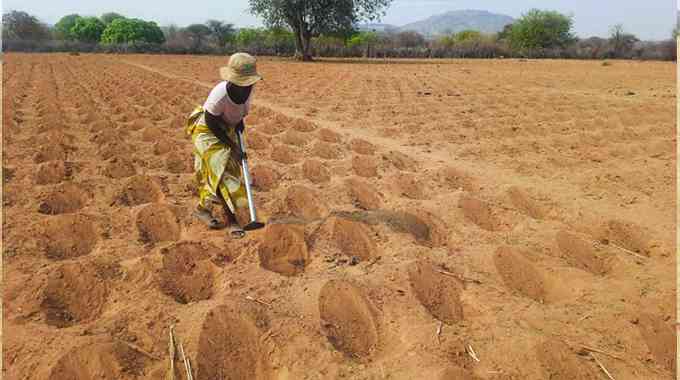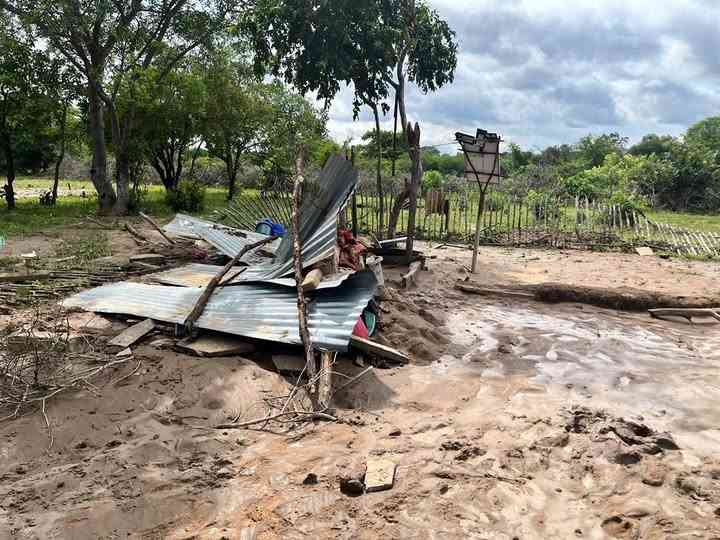
“Asisaceli lutho kubo baba, sesicela ukudlula kuphela,” which literally translates “we ask nothing from our husbands, we just ask to pass by,” said Moreblessing Ncube, a beneficiary of the Divine Hope Farmer Field School, as she eloquently expresses the impact of the programme.
This statement reflects the newfound confidence and independence that women have gained through their participation in the Green Climate Fund, Farmer Field School.
By learning sustainable farming practices, conserving the environment, and generating income, women are no longer solely dependent on their husbands.
This has not only improved their economic standing but has also led to a significant reduction in gender-based violence.
Ncube is a farmer under the Devine Hope Farmer Field School in Sigodini Village under Chief Fuyane in Ward 10 of Matobo District, Matabeleland South province.
“We have seen significant improvements in our lives thanks to the farmer field school,” she said.
“We have learned how to farm sustainably and conserve the environment and land, even in the face of drought.
“We now grow vegetables, mushrooms, and raise goats.
- AfDB approves Energy Access Finance Framework
- AfDB approves Energy Access Finance Framework
- Foregrounding the capture of climate finance to developing countries
- Post COP27, taking stock, celebrating or counting losses
Keep Reading
“This has empowered us to feed our families and even sell our produce to send our children to school.
“We are no longer dependent on our husbands and this has improved our relationships at home and reduced instances of gender-based violence, which is often exacerbated by hunger.”
Proper Nkomo (52), the lead farmer of the Divine Hope Farmer Field School, emphasised the transformative power of the initiative.
“We have peace because we managed to eliminate hunger in our homes,” Nkomo said.
By addressing food insecurity, the FFS has created a more harmonious environment within families and communities.
“Complete dependence on a husband can be detrimental to a relationship,” Nkomo said.
“The wife may blame the husband for not providing enough, while the husband may blame the wife for wasting food.
“This can lead to verbal or physical abuse.
“Since the introduction of this project, we have seen a significant decrease in cases of gender-based violence.
“Women are now empowered to take care of their families, and husbands are also involved in supporting our projects.
“There is a sense of peace and harmony in the community.”
The GCF FFS has not only reduced gender-based violence, but has also significantly enhanced the community’s agricultural practices.
By equipping farmers with knowledge and skills to adapt to changing weather patterns, droughts, and floods, the project has helped mitigate the devastating impacts of climate change on rural livelihoods.
This has been crucial in safeguarding crops and ensuring the sustainability of agriculture-dependent communities.
The government, through the Ministry of Lands, Agriculture, Fisheries, Water and Rural Development, in partnership with the Green Climate Fund (GCF) and the United Nations Development Programme (UNDP), under the Building Climate Resilience of Vulnerable Agricultural Livelihoods in Southern Africa programme, rolled out the FFS concept to promote peer-to-peer learning.
Over 230 FFS have been established under the programme.
In ward 10 of Matobo district, under the GCF programme there were 35 lead farmers, each with 10 follower farmers, making a total of 350 in the ward.
“To address the limited rainfall in our region and improve soil health, we have adopted a variety of climate-resilient agricultural practices,” said Nkomo.
“By implementing techniques like basin creation, infiltration pits, and mulching, we are effectively conserving water and enhancing soil fertility.
“These measures help to reduce water runoff and promote the growth of traditional grains, which are better suited to our local conditions and can bolster our resilience to climate change.”
For Ncube and her fellow villagers GCF FFS has proven to be a fountain of knowledge.
“The GCF-funded Divine Hope Farmers Field School has equipped us with the knowledge and skills to adapt our farming practices to the changing climate,” she added.
“By learning about drought-resistant crops, water conservation techniques, and sustainable farming methods, we are better equipped to cope with the challenges posed by climate change.
“This programme has been a vital resource for our community.”
Under the GCF programme, there is Participatory Integrated Climate Services for Agriculture (Picsa).
Sithandekile Dube, an agriculture extension officer, emphasised the significant role that the application of Picsa can play in mitigating climate change and its impacts on the rural economy, environment and society.
Picsa is a collaborative approach that empowers farmers to make informed decisions about their agricultural practices by providing them with access to climate information and tools.
“Picsa is empowering farmers to make informed decisions about their agricultural practices, fostering more sustainable and resilient livelihoods,” Dube said.
“By integrating climate information and tools into their decision-making processes, farmers can adopt climate-smart strategies that reduce greenhouse gas emissions, protect biodiversity, and enhance food security.”
Nelson Chanza, a climate smart agriculture expert for the GCF project, highlighted the crucial role played by the FFS in advancing climate-smart agriculture.
Chanza explained that FFS provide a platform for farmers to share their challenges and for researchers to offer customised technological solutions.
This collaborative approach facilitates peer-to-peer learning and empowers farmers to adopt climate-resilient agricultural practices.









